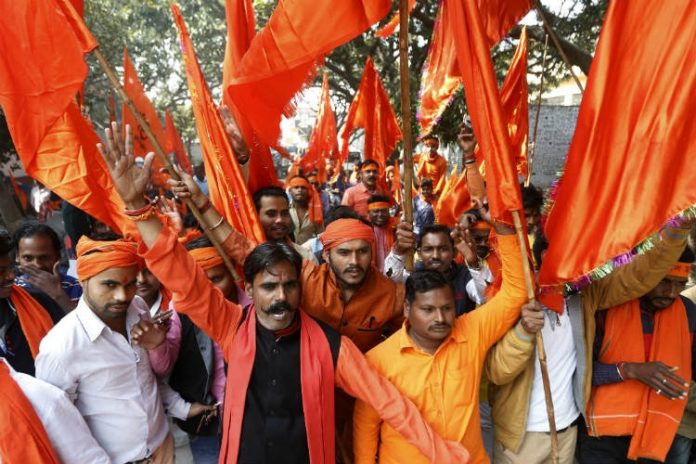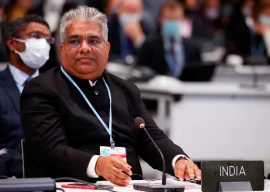
Hindutva activists in India are enforcing a hardline Hindu culture and promoting Islamophobia by pushing for the withdrawal of recently aired progressive advertisements, as part of the ruling BJP regime's campaign to make the neighbouring country a Hindu authoritarian state. This was stated in an article published in the Washington-based international online magazine, the Diplomat
'It is no longer ‘Incredible India’ but ‘Intolerant India’,' read the headline of the article, pointing to Indian Prime Minister Narendra Modi’s ruling BJP's lack of inclination to fight hate.
The Diplomat’s correspondent, independent journalist, Kavita Chowdhury said this year’s Diwali-related advertisements faced “backlash” from Hindutva activists across India.
“Clothing brand Fab India’s promo advertisement in the run-up to Diwali titled ‘Jashn-e-Riwaaz’ was targeted for using Urdu words to describe the Hindu festival of Diwali,” she wrote.
The ruling BJP’s Yuva Morcha (youth wing) president Tejasvi Surya lashed out at the advertisement stating that it was a “deliberate attempt of Abrahamisation of Hindu festivals,” according to the report. “Significantly, Surya has been a serial rabble-rouser with a history of inciting people against Muslims by generating controversies”.
The report said: “The BJP’s troll army soon took to Twitter, with #BanFabIndia trending and some even demanding that models in advertisements should have ‘Hindu appropriate dressing’ with women sporting a bindi, a traditional dot on the forehead of Indian women.
A right-wing influencer lashed out at the ‘secularisation’ of Hindu festivals, tweeting #NoBindiNoBusiness and calling for a boycott of brands that did not comply with the sentiments of Hindu culture. Consequently, Fab India not only withdrew its promo advertisement but tried to mollify the right-wing by stating that its soon-to-be-launched Diwali campaign was titled an innocuous ‘Jhilmil Si Diwali’.
While the targeting of a skin bleach advertisement is an attempt to enforce rigid codes of normative Hindu culture with a homophobic worldview, the Fab India advertisement controversy is an attempt to entrench Islamophobia in the masses. The saffron brigade and its votaries, namely the BJP politicians, assign themselves the role of custodians of Indian culture.
Highlighting India’s cultural and religious diversity, especially Hindu-Muslim brotherhood, angers the right-wing.
Significantly, the increasing attacks on advertisements have coincided with the mainstreaming of hate politics championed by the BJP under PM Modi.
India criticises fossil fuel language in COP26 draft deal
Islamophobia in India has escalated to ridiculous heights. Linguists point out that the language Urdu is not the sole preserve of Muslims in the country, but Urdu words are widely used in everyday speech and literary texts of the Hindustani language.
Incidentally, these were not the only advertisements that were targeted by the Hindutva brigade this festive season. The brand CEAT Tyres was viciously trolled and faced an onslaught of online abuse after its Diwali advertisement featured Bollywood actor Aamir Khan, advising children not to burst firecrackers on the streets but within the apartment complex.
BJP Member of Parliament Ananth Kumar Hegde, who habitually spews communal venom, wrote to the CEO of CEAT Tyres accusing the company of ‘creating unrest among Hindus'. In his letter, which he made public on Facebook, Hegde also attacked the Muslim actor. ‘Nowadays, a group of anti-Hindu actors always hurt the Hindu sentiments whereas they never try to expose the wrongdoings of their community,' he wrote.
In a long rant, Hegde lashed out at Muslims in general for offering prayers (namaz) on the roads, which he said was public property. He described the call to prayer (azaan) as noise pollution. He issued a dire warning to the company to “not hurt Hindu sentiments” in future.
Hindutva leaders are now turning Hindu festivals into a weapon against Muslims, says Apoorvanand, a professor at Delhi University. The backlash against these recent advertisements is certainly an indicator of this trend.
Such intolerance and backlash are undermining creative freedom in India and increasingly shrinking space for creativity. Advertisements in India have generally been a reflection or marker of changing times and society."
However, the recent spate of attacks by intolerant hate-mongers will make advertisement agencies and corporations in India more concerned and will lead them to avoid using progressive ideas. Online abuse and trolling are not isolated acts but have the political backing of the powerful BJP IT cell.
The article further mentioned that "last year too, during the festive season, jewellery brand Tanishq faced the ire of Hindu right-wing. The brand in its advertisement ‘Ekatvam’ (unity in oneness) depicted a pregnant Hindu woman being lovingly given a baby shower by her Muslim in-laws. The advertisement text read:
‘She is married into a family that loves her like their own child. Only for her, they go out of their way to celebrate an occasion that they usually don’t. A beautiful confluence of two different religions, traditions and cultures.’
Accusing Tanishq of promoting ‘Love Jihad’ (a conspiracy theory claiming that Hindu women are being forcibly converted by Muslims through marriage), the Hindutva activists called for a boycott of the brand, leading to #BoycottTanishq trending. The outrage spilled over offline as well with a Tanishq jewelry showroom in Gujarat being threatened and forced to display an apology at its store. They were reports of the brand's Muslim store managers’ contact details being made public online.
Tanishq ultimately pulled out the advertisement stating, ‘We are deeply saddened with the inadvertent stirring of emotions and withdraw this film, keeping in mind the hurt sentiments and well-being of our employees, partners and store staff.’
However, the brand’s capitulation to right-wing trolls was strongly criticised, with a section of Twitterati labelling it ‘spineless corporate India.’ Many pointed out that when corporations make bold advertisements, they should not get brow-beaten by trolls but stand up for their values — as did the American footwear brand Nike, which despite a severe backlash, boldly made National Football League (NFL) star Colin Kaepernick its brand ambassador. Kaepernick had ‘taken the knee’ i.e. kneeled during the United States national anthem to protest against racial injustice.
Last year, soon after the Tanishq advertisement backlash, advertising bodies in India urged the government to act against intimidation by Hindutva trolls. But India’s ruling BJP is not inclined to fight hate. Rather, it is encouraging unbridled Hindutva for electoral gains. As intolerance gallops, vitriolic attacks against advertisements continue unabated.”

1721377568-0/BeFunky-collage-(18)1721377568-0-165x106.webp)



1732618327-2/Untitled-design-(7)1732618327-2-270x192.webp)















COMMENTS (1)
Comments are moderated and generally will be posted if they are on-topic and not abusive.
For more information, please see our Comments FAQ